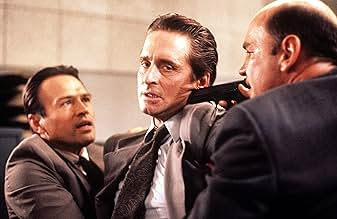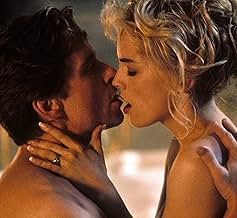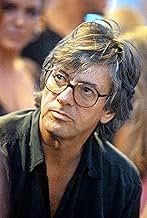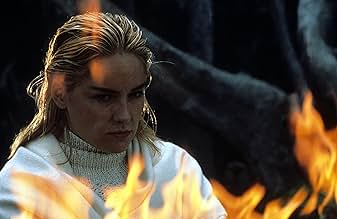Un poliziotto violento investiga un brutale omicidio in cui una bella e seducente scrittice di romanzi potrebbe essere coinvolta.Un poliziotto violento investiga un brutale omicidio in cui una bella e seducente scrittice di romanzi potrebbe essere coinvolta.Un poliziotto violento investiga un brutale omicidio in cui una bella e seducente scrittice di romanzi potrebbe essere coinvolta.
- Regia
- Sceneggiatura
- Star
- Candidato a 2 Oscar
- 6 vittorie e 23 candidature totali
- Lt. Martin Nilsen
- (as Daniel Von Bargen)
Recensioni in evidenza
I always considered this to be a Hitchcock style film, but now that I'm working my way through his catalogue I'm not too sure, although it does put me in mind of the noir films from the 40's.
It's a super sexy thriller, and let's be honest, the infamous sex scenes have this film a lot more notoriety than it ultimately deserved, it's a good film, but in no way is it a classic.
It has a degree of suspense and tension, you are made to wait a long time to learn if she did or didn't, and the big reveal scene is worth the wait, and perhaps the film's best scene.
Douglas and Stone are both very good, and there's a definite chemistry between the pair, it is one very attractive cast, Stone is genuinely jaw dropping throughout.
It is hard to watch this movie without thinking of the many spoofs that followed, that infamous interview scene was sent up several times, and rightly so.
Considering it's now over thirty years old, I'd suggest it's held up rather well.
7/10.
As has been mentioned, there are echoes of Hitchcock's Vertigo throughout the film, including the San Francisco setting, the attire of the female lead (Catherine, played by Sharon Stone), the styling of her hair, the background music, the shots of interior stairwells, and the lead character (Nick, played by Michael Douglas) following Catherine around the city in his car. The apartment of Beth (played by Jeanne Trippehorn) might also remind one of Rear Window.
Many of the characters have emotional/psychological problems like addiction, dependency, or worse. This makes it more difficult for the viewer to determine the motivations of the suspects. Nick--the filter through which we see all evidence--is flawed. We learn that he has had problems with cocaine and alcohol. Sexually, he is ripe for exploration and, maybe, manipulation.
The film walks a fine line between revelation and obfuscation. In the course of the story, murders are committed, and we are given just enough information to pull us deeper into the mystery, but not enough to reveal the truth. Even the ending leaves the future ambiguous.
This is an excellent mystery for the nineties. The acting is excellent, especially that of Sharon Stone who plays the rabbit we gladly follow down the rabbit hole where the rules of the game are confusing and constantly changing.
I will not go deeply into plot detail, as the story is practically part of hollywood folklore, but in summary volatile cop Nick Curran(Michael Douglas) falls in love with murder suspect Catherine Trammell(Sharon Stone) who may,or may not, have brutally murdered her lover with an ice pick. If the plot sounds familiar its probably due to the fact that Basic Instinct is essentially a combination of writer Joe Eszthera's film 'Jagged Edge' and director Paul Verhoeven's film 'The Fourth Man', both of which had their fair share of sex and fashionable violence. Despite this Basic Instinct still is enjoyable and having seen either of those films will have no affect on the unpredictability of the film.
At the centre of the film is Stone's performance which is actually quite superb(though in the long run this film's been more of a curse than a blessing to her film career)as although she's easily the least probable femme fatale ever to grace(or poison to be more accurate) the silver screen, Stone plays her with such zeal that we can't take our eyes off her. That said it should also be pointed out that she becomes rather less intriguing after the first 40 minutes when she becomes involved with Michael Douglas, as her character loses a great deal of her mystique and her personality has less bite. Then of course is the infamous scene (which practically every other reviewer has mentioned and I am going to be no exception) where Tramell is being interrogated by the police and coolly turns the tables on them by exploiting their libidos and reducing them to drooling idiots, totally ridiculous but easily the film's best scene and certainly one that is not going to be soon forgotten (no doubt to the chagrin of Sharon Stone).
The rest of the cast are fine, with Michael Douglas doing the character he does best(the rather thuggish white male who constantly gets involved with the wrong kind of woman), Jeanne Tripplehorn doing an adequate job as Nick's pyschologist and George Dzunda manages to be the only half-way likable character in the movie as Curran's best(and only)friend. Unfortunately Leilani Sarelle is under-used as Catherine Trammell's enigmatic girlfriend(I forgot to mention Catherine's Bi-sexual).
The film is, of course, not without flaws. No-one (not even the director) could deny that Basic Instinct has such big plot holes you could park a car in them as for some of the events in the film to make sense characters would need to be either clairvoyant or in possession of other-worldly powers. The endings also a bit of a cop out (no I WON'T reveal it) as it was clearly engineered so that it could be easily changed with a single edit if preview audiences were unsatisfied with it.
It is also impossible to ignore the huge controversey that surrounded the films release with a particulair furor being caused by feminists and lesbians over their portrayal in the film. In truth the jury's still out on wether Basic Instinct is homophobic, but I personally don't think it is as the characters' sexuality is never really an issue although in fairness it is used as a somewhat cheap plot device to titillate the audience. The case made by feminists is much stronger as all the women in the film are portrayed as dubious and potentially dangerous. The main defence against all this is that, frankly, all the characters are unpleasent and devious , with perhaps one exception, and no discrimination is given in any way. The other issue was, of course, the sex scenes which ,although explicit, are really rather passé these days.
The film is stylishly filmed, expertly paced, brilliantly directed and has a superb music score from Jerrry Goldsmith. I'll give it a high score(by my standards) of 8 out of 10
For example, Catherine Tramell(Sharon Stone) is a writer whose murder plots exactly follow the murders that occur in the film. Her coolness and openness about these killings gives her a sense of being in control of Nick Curran's(Michael Douglas) destiny. In this way, she is like cinema itself spinning a predetermined plot line that the audience represented by Douglas just follows.
Throughout the film, the detective seems resigned to his lack of control, totally in awe of Catherine Tramell ready to go along with her. This is similar to the way the audience submits itself inside the cinema to the control that the screen exerts. However just as we do, Curran attempts to predetermine the plot with his own expectations. He tells Tramell that he has his own idea how it will end - "The cop survives" - The final question of "What do we do now, Nick?" is met with "F*** like minxes, raise rug rats, live happily ever after." another idealistic expectation of the cinema audience. However the ambiguous final shot reminds us that Douglas/the audience may not get the ending he wants - only cinema decides whether that ice pick under the bed will be used.
Another parallel with the cinema experience is the way Nick Curran seems to identify with Tramell. At the start he is a recovered smoker and drinker and Tramell gets him to start again. Over the course of the film his attraction to Tramell's character makes him take on more and more of her traits - aggressive sexuality, risk taking, use of her dialogue and more and more leaps into fantasy. He is almost merging with her and this is reflected in his interrogation scene being shot identically to Tramell's earlier one. Again this development mirrors the way cinema audiences identify with the film narrative. The Hollywood ideal is that the viewer leaves his/her outside of the cinema in order to temporarily identify with the fantasy characters on screen.
Another main aspect of the cinema experience touched on here is the voyeuristic process of watching itself. Curran is constantly in a spectatorial position. It is most obvious where he watches Tramell through a window that looks like a cinema screen itself. Another scene where he is trying to find out about Tramell on a computer sees him reprimanded by a colleague for "jacking off to the screen". This likens Douglas to an audience member watching the film in a similarly voyeuristic way. This is the reason why Hitchcock is such a strong influence on this film - these are classic Hitchcockian themes.
My final comparison is the bi-directional aspect of cinema touched on in the film. The interrogation scene where Tramell manipulates the audience of detectives is the only time where Tramell has point of view, reminding us that cinema watches and manipulates us as well. Also the fact that throughout Tramell knows so much about Detective Curran's past is a similar device. Tramell uses what she knows about Curran to make her murder work, just as Hollywood exploits what it knows about our desires of movies in order to sell us their product. (And those desires may have been partly contrived by Hollywood).
The female murderers (who look like old film stars) that Tramell hangs around with represent other archetypal Hollywood stories - maybe these could have been other films that Nick Curran watched before when he took up smoking before.
Is it a coincidence that the words "cinema theatre" can be found in the name Catherine Tramell and the word "audience" can be found in "Detective Nick Curran" ?
Probably.
Lo sapevi?
- QuizNo body doubles were used in any of the sex scenes.
- Blooper(at around 45 mins) When Nick calls up Hazel Dobkin's police record it states that she was released from San Quentin in 1965. San Quentin has been men only since 1934.
- Citazioni
Dr. McElwaine: Nick, when you recollect your childhood, are your recollections pleasing to you?
Nick: Number 1, I don't remember how often I used to jerk off, but it was a lot. Number 2, I wasn't pissed off at my dad, even when I was old enough to know what he and mom were doing in the bedroom. Number 3, I don't look in the toilet before I flush it. Number 4, I haven't wet my bed for a long time. Number 5, why don't the two of you go fuck yourselves; I'm outta here.
- Versioni alternativeThe European release is much more explicit than the American release (which had to be submitted seven times to the MPAA in order to avoid an NC-17 rating). The European version is available unrated on video in the US. The US version uses alternate, less explicit takes of several scenes to tone down the sex content.
- The murder of Johnny Boz in the opening scene is more graphic; we see the killer stabbing him in his neck, stabbing him repeatedly in the chest, in the face and we see the ice-pick passing through his nose.
- The scene where Nick rapes Beth is severely cut in the US version (we see ripping off her underwear and forcing her over the couch, then there's a cut to the two of them lying in bed). In the uncut version Nick pulls down his pants, penetrates Beth from behind and he apparently has an orgasm.
- The scene where Nick and Catherine make love after going to the disco is longer much more explicit in the uncut version (Nick is seen burying his face between her legs).
- ConnessioniEdited into Y2K (1999)
I più visti
Dettagli
- Data di uscita
- Paesi di origine
- Sito ufficiale
- Lingue
- Celebre anche come
- Basic Instinct - Istinto di base
- Luoghi delle riprese
- 157 Spindrift Road, Carmel Highlands, California, Stati Uniti(Catherine Tramell's mansion)
- Aziende produttrici
- Vedi altri crediti dell’azienda su IMDbPro
Botteghino
- Budget
- 49.000.000 USD (previsto)
- Lordo Stati Uniti e Canada
- 117.727.224 USD
- Fine settimana di apertura Stati Uniti e Canada
- 15.129.385 USD
- 22 mar 1992
- Lordo in tutto il mondo
- 352.927.224 USD








































